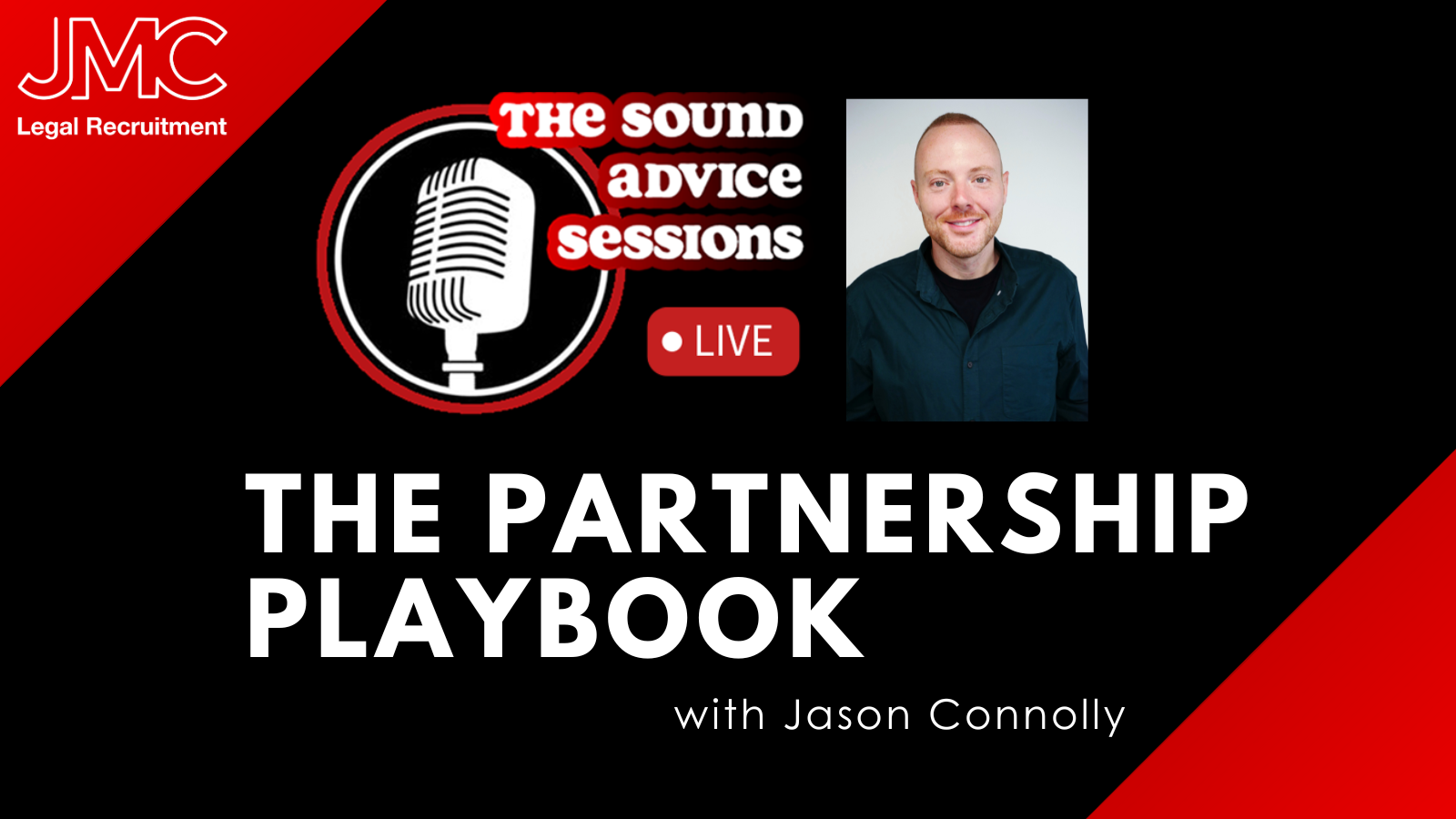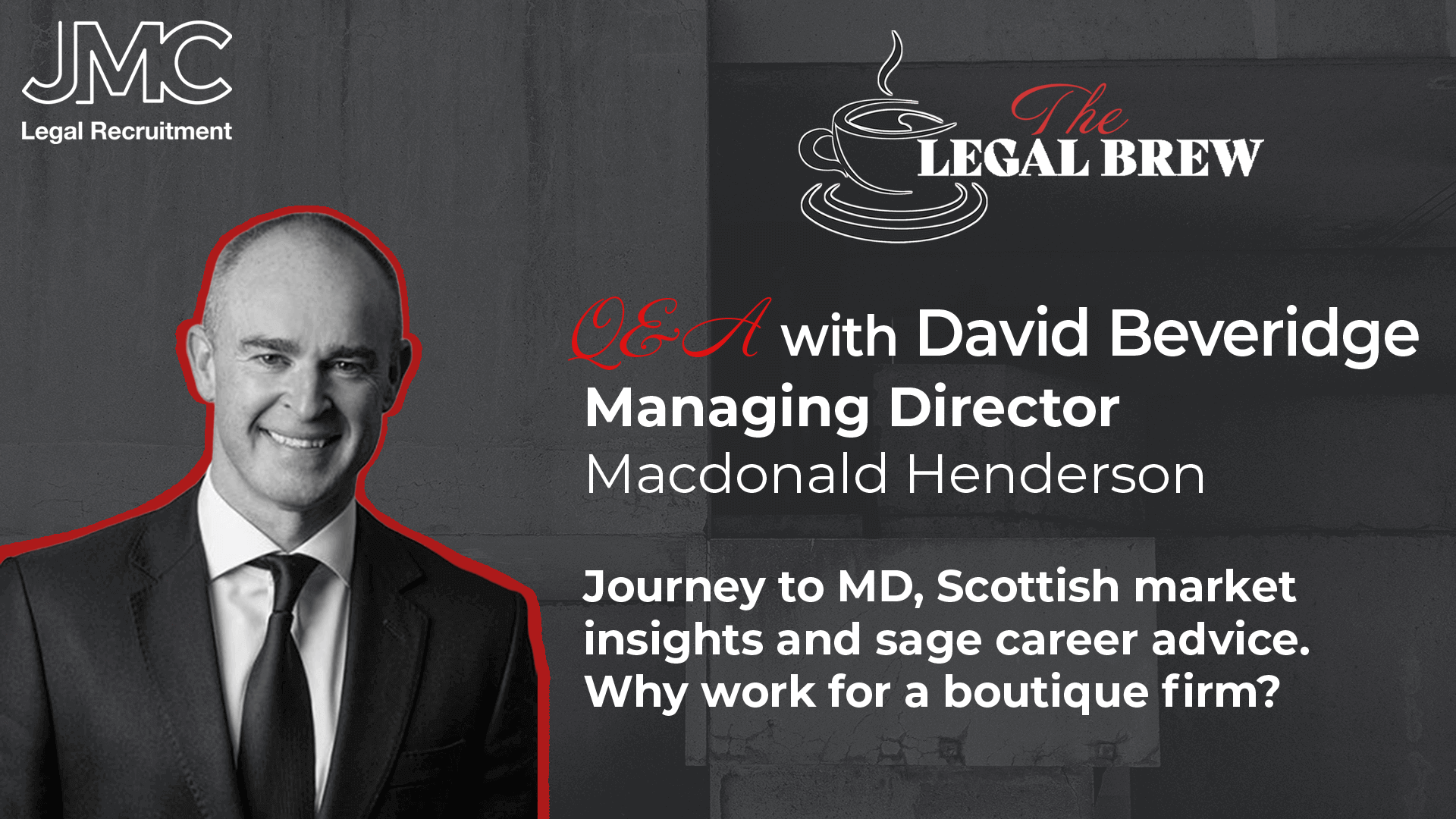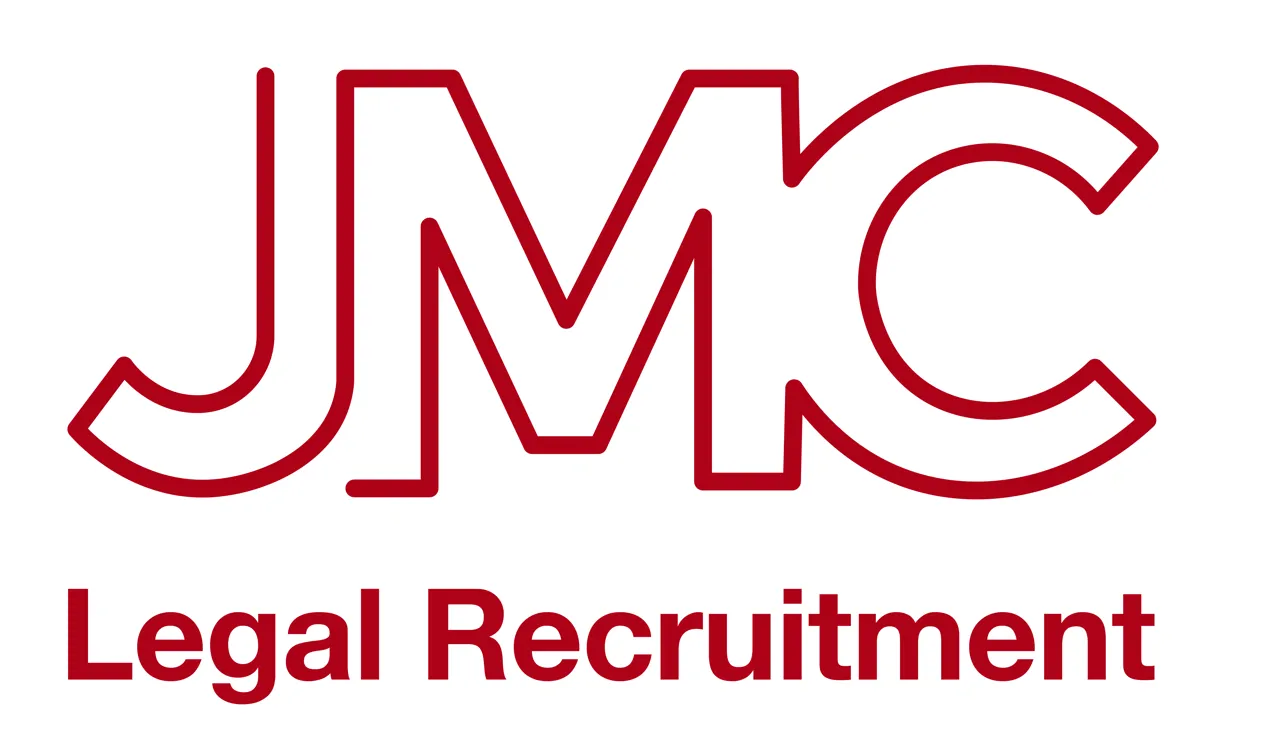
An Interview with David Beveridge – Managing Director of Macdonald Henderson
29 Aug, 20248 minutes
I recently had the pleasure of sitting down with David Beveridge, the Managing Director of Macdonald Henderson, the leading corporate law firm based in Glasgow. In typical corporate lawyer fashion, David was in the middle of a number of important transactions but still lent me some of his valuable time to delve into his back story, a discussion of the benefits of working for a smaller practice and some observations on the Scottish market. We finished our conversation with some sage advice that any early career lawyer could benefit from implementing.
What led you to become one of the youngest law firm leaders in Scotland?
David started out his career working for two of Scotland’s leading firms – McGrigor Donald (now Pinsent Masons) and Maclay Murray & Spens (now Dentons).
In 2005, he decided he wanted to experience a different type of firm, one which combined high-quality work with increased client contact and enhanced agency. He joined Macdonald Henderson; a firm already well-established in Scotland as a leading niche practice in the corporate space.
Working directly alongside Morinne Macdonald, the firm’s founder, David got stuck into a remarkable range of high-quality coal-face corporate work, spanning an impressive number of sectors in a fast-paced environment.
Clearly having a positive impact on clients and taking to the firm’s culture, in 2009, at the age of 34 David was offered the opportunity to lead a buy-out of the firm on Morinne’s retirement. Through a combination of a bank loan and “cobbled together” personal capital, David assumed ownership of the firm shortly thereafter.
Under his leadership, Macdonald Henderson has furthered its reputation as a leader in the Corporate and Commercial sectors, winning awards, climbing the Legal 500 ranks and more than quadrupling turnover since the buyout.
An overview of Macdonald Henderson
If you ever find yourself in a lift with David, he may give you the 60-second overview of Macdonald Henderson.
“We are Scotland’s foremost niche Corporate and Commercial law firm, providing blue-chip level advice at a reasonable cost, to Scotland’s leading entrepreneurs, scale-ups, family businesses and SMEs”
And how does the firm seek to differentiate itself in a highly competitive legal market?
“It is all about client experience. We have a highly agile and communicative style with a response speed which is second to none. Clients have visibility at all times. Allied with highly experienced, reliable lawyers and first-class technology, our speed of engagement, onboarding, document management and deal execution is first-rate. We compete like-for-like with the bigger firms on a compelling cost base”
It is clear why clients may choose to work with the firm, but what are some of the benefits for lawyers working out of a smaller practice?
“There are many benefits to working at a firm like ours. We place more emphasis than any other firm on getting lawyers to a place where they can operate independently. Frequently, our future trainees join us a year before they commence their traineeship as a Corporate Analyst, meaning by the time they come to qualify they have 3 years of working in a fast-paced and engaging legal environment.
Resultantly, from day one, our lawyers are confident and empowered to lead client relationships, focus on tangible outcomes and develop commerciality.
Furthermore, being sector agnostic means solicitors are never pigeonholed and are frequently found advising clients in technology, FMCG, finance, manufacturing, medical, retail, engineering, creative and more. It is an enriching and engaging environment which allows lawyers to develop a broad range of experience quickly and hone in on their passions. We then support and encourage them to develop their own strengths and areas of interest.
In a smaller environment, the platform we provide encourages lawyers to be the entrepreneurs of their own careers, and we have the desire and flexibility to recognise their efforts.”
Internal progression is something which is clear to see at the firm. The majority of the team has been in situ for years, and many who began as trainees have progressed to Associate Director or Director level (the equivalent of an Equity Partner for an LLP). A smaller firm environment can make it easier to gain recognition for your efforts and to differentiate yourself in a crowded legal market.
David was also keen to mention that being a smaller firm, all of his lawyers are acutely aware that law is a business, ultimately there to look after clients and stakeholders whilst earning a return. Since lawyers are closer to and involved in the strategic decision-making of the firm, it is easier for them to develop the commercial awareness and acumen that business leaders need to thrive.
What are some of the biggest challenges the firm has faced over the years and how did you overcome them?
The most challenging period of David’s leadership of the firm came in 2008 when David steered the firm through the financial crisis and its aftermath. He describes it as somewhat of a “baptism of fire” as a business leader, with deal volumes collapsing, investment stalling and instability across the economy running rife.
However, adapting quickly, there are some key lessons which David learned from this time which have ensured the business is able to weather less than desirable macro-economic climates.
“Financial rigour was vital. Firstly, we made sure to invoice and collect on payment quickly to guarantee stable cash flow. We focused in on utilisation and recovery rates, operating in a streamlined manner and conducting our usual high-quality work in as efficient and effective a manner as possible.”
The difficulties faced however, presented opportunities for the nimble firm to drive future growth. It was a time where, when many others looked to avoid the expense, Macdonald Henderson focused on hiring some exceptional lawyers to grow the team.
“Talent is always the secret to success for any firm with ambition.”.
In terms of the biggest challenges Macdonald Henderson are facing currently, David points to the increasing compliance burden being placed on firms. Whether in regard to AML, data protection, client engagement procedures, source of funds and wealth, the volume of obligations is expanding year by year.
The firm are tackling this issue head on, by ensuring rigorous compliance mechanisms, implementing innovative technology and utilising external consultants to bear the brunt of this time-consuming work. This multi-pronged approach is designed to ensure that their lawyers can focus on what they are best at and can dedicate more time to professional development and supporting clients.
Amidst this challenging environment, there are plenty of opportunities lying ahead of the firm too. David highlights the volume of client enquiries across the spectrum of practice areas they are receiving. There is no lack of work and as a result, there is plenty of green space for the firm to develop as it expands.
What does success mean to you?
Having now run the firm for nearly two decades, I wondered how David defines success and whether this has evolved through his time as MD.
“Success remains the ability to attract and retain fantastic clients with whom we can develop business relationships which are robust and can stand the test of time. But running in tandem with this is another measure: to retain, recruit, incentivise and motivate clever and talented people.”
Thoughts on the legal market?
As a Corporate and Commercial firm at its core, I ask David about the various economic and social challenges that Macdonald Henderson has had to manage in recent years, least of all the Covid pandemic, increasing international conflicts and macroeconomic uncertainty.
“We have not witnessed the same slowdown that many of the larger businesses have seen in relation to deal volume and investment. Largely this is because in the businesses and sectors we tend to engage in, the fundamentals which drive corporate work are still solid. Notwithstanding the headwinds we have all faced, the economy is pushing forward (albeit gradually). Visibility on interest rates has improved, inflation is considered to be under control and domestic political instability has lessened, all of which is positive for the overall market.
Ultimately, within the SME, family business and entrepreneur market there is a vibrant community of businesses operating in Scotland.
We are witnessing some key trends which are providing support to our continued growth. There is a general need for succession planning and management teams are stepping up and looking at exit strategies. As a result, we have witnessed a huge volume of disposal activity.
Notably, businesses are staying in Scotland following M&A activity. Private equity and foreign investment into Scotland have continued to increase, providing impetus to businesses of all shapes and sizes. Organisations are benefiting from the skilled talent market meaning they can continue their growth from a Scottish base.
Employee Ownership Trusts have also been a real boon for the Scottish economy. It has provided another route of exit for business owners, whilst compelling employees to be a part of the success of their organisations in a manner which is encouraging positive growth.”
In terms of the talent market, I ask whether there are any trends David has witnessed in Scotland.
Although the legal talent market has softened since the heights of the COVID-19 boom, it remains highly competitive. David believes that solicitors now assess potential positions in a much more holistic way then they did when he started out in the profession.
Softer elements have come to the forefront of concern for many of the lawyers he speaks with. They want a deep understanding of the firm’s culture, what their day-to-day will be like, the dynamic of the team they are joining and what support is there to encourage ongoing development.
That being said, the fact remains that the beating heart of a high-performing law firm is quality lawyers, and salaries are a core component of attraction and retention. With expanding incumbents and new entrants breaking into the Scottish market each year, David notes that Macdonald Henderson is constantly reviewing their salary bandings and adopts an aggressive yet pragmatic approach to remuneration. Salaries at Macdonald Henderson compete with larger firms which, along with a transparent bonus scheme and the ability for lawyers to develop a personal brand within the firm, helps attract top candidates.
Do you have any words of wisdom for those junior lawyers looking to make the most out of their career in private practice?
“Firstly, try and push yourself. Be present with your team, be visible – be in the line of sight and develop your experience by learning side by side with more experienced lawyers.
Guard against the temptation to work from home and be office-based whenever possible.
Ask senior colleagues to allow you to sit in on important discovery and negotiation calls and meetings, even if you are simply taking notes. Learning through osmosis is vital. Put your hand up to do things which are outside of your comfort zone and never allow your learning to be static.
Junior lawyers should look to differentiate themselves by knowing their subject inside and out. Staying up to date with your skill set cannot be underestimated. Don’t purely focus on the technical front, however: you should be constantly looking to upskill your business development activity and general commercial acumen.
Finally, seek to add value not just in the quality of your work but in the pace you conduct it. Being diligent in completing work efficiently and developing a reputation for delivering on time and, even better, on (time) budget will serve you well.”
Concluding thoughts
Boutique firms are a vital part of the legal ecosystem. They are engines of entrepreneurship and provide an altogether different experience for clients and staff members alike. If David’s experience and the success of Macdonald Henderson is anything to go by, lawyers seeking agency, development opportunity and a platform from which to differentiate themselves in the market should seriously consider alternatives to the draw of large-scale private practice business models.
If you are interested in exploring opportunities at boutique firms in Scotland, or simply benchmarking against your current position then you can reach me via phone or email for a confidential, no-obligations chat.
Written by Jules Grieve – Senior Consultant - Scotland
jules@jmc-legal.com
0131 460 7747




